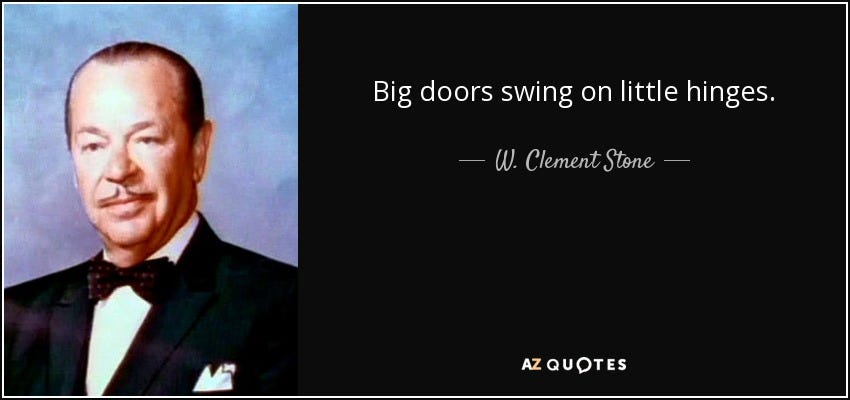The Secret of 20 In the 80/20 Rule
Using high leverage opportunities to simplify success in the real life.
👋 Hey Friends,
I've always found the 80/20 rule, also known as the Pareto principle, super interesting!
It was first observed by an Italian economist named Vilfredo Pareto in 1896. He noticed that only 20% of the population in Italy owned a whopping 80% of the land - pretty crazy!
Basically, this principle suggests that a big majority of outcomes in any given system are caused by a relatively small number of possible reasons.
Even though the ratio may not always be exactly 80% of outcomes produced by 20% of reasons, it's a helpful way to figure out what's really driving certain outcomes.
For example,
in the US, the top 10% of taxpayers pay 70% of the federal income taxes, and they also possess 69% of the country's wealth.
only 20% of our habits—think regular exercise and smart eating—drive 80% of our health gains.
just 100 common words, a tiny 0.06% of all the words in the English dictionary, show up in more than 25% of what we read and write!
So if we can figure out the “20” in the 80/20 rule, our life is sorted.
I refer to this “20” as:
“The little hinge that swings the BIG door”
Unknowingly I’ve used it many times in my own life.
At Twitter, about 90% of how people saw me was based on just 10% of my time there, mainly when I was giving presentations. Often it was just one slide that made the difference..
Around 70% of the good things that happened in my career were due to just 5% of my actions, like making smart choices at the right times, hiring the right person, finding the right mentor, and taking the right risk.
As a dad, nearly 80% of what my kids remember from their childhood is from just 1% of my time with them, either the very best or the very worst moments. I've learned to cherish the good times and fix the bad ones.
One of the most important choices we can make in life is whether to work harder or smarter.
As we grow older, we come to appreciate the value of working smarter, which means identifying the High-Leverage Opportunities that can help us solve multiple problems at once.
These are those little hinges.
When facing challenges, it's always helpful to focus on the one macro problem that, once solved, can resolve most other issues.
For example, in our profession, the macro problem is often having the wrong team.
Believe it or not, that’s what it is!
This can lead to a number of problems that require attention, but hiring the right team can solve all those problems in one go.
Hiring the right team (one person at a time) = Little hinge
I am always on the lookout for opportunities that have high upside potential and limited downside risk.
This approach is influenced by the Shark Tank way of thinking.
In the past, I used to take big risks to achieve big rewards, but after losing big a few times, I realized that this wasn't sustainable. Now, I aim for moderate risks and high rewards.
When I reflect back on my personal and professional life, I notice that the 20% of decisions that have led to 80% of my success have been related to people and intangible assets.
People decisions include:
who I spend time with,
who I let into my life,
who I hire, and
who I ask to mentor me.
Intangible assets, on the other hand, include
long-term relationships built on trust,
a good reputation earned over time by treating people well, and
expertise and skills acquired and leveraged over time.
mindset
I have found that these intangible assets are just as important, if not more so, than tangible assets.
The 20% that has had the greatest impact on my life may not be the same as the 20% that could make a big difference in your life.
My point is not that you should imitate what has worked for me, but instead, identify which 20% of your life has a significant impact on the positive outcomes you desire.
Have a wonderful week ahead.
- Vibhor ✌️
Quote of the Week
“There are two synergistic approaches for increasing productivity that are inversions of each other:
1. Limit tasks to the important to shorten work time (80/20).
2. Shorten work time to limit tasks to the important (Parkinson's Law).
The best solution is to use both together: Identify the few critical tasks that contribute most to income and schedule them with very short and clear deadlines.”
― Timothy Ferriss
Last Week’s Posts
🙏 Thank You!
If you liked this post from “My Journals,” please give it a thumbs up.
Here, I try to give you Career, Progress, and Self-Development insights as I learn them myself.
Wish you a successful career journey ahead.
Until next week 👋
“I share things I wish I knew in the starting years of my career in the corporate world."
Vibhor Chandel




Thank you Vibhor